护理英语会话
医学英语会话医生篇

医学英语会话医生篇一、Asking about Symptoms(询问症状)1. Word: Ache- English Explanation: A continuous dull pain.- Phrase: Headache, toothache.- Usage: “I often get an ache in my lower back after sitting for a long time.”- Bilingual Example: “Do yo u have any aches? For example, a headache or a stomachache? I need to know what's wrong with you.”2. Word: Nausea- English Explanation: A feeling of sickness with an inclination to vomit.- Phrase: Nausea and vomiting.- Usage: “Sheplained of nausea this morning.”- Bilingual Example: “You look a bit pale. Are you feeling nausea? It could be a sign of many things.”3. Word: Fatigue- English Explanation: Extreme tiredness resulting from mental or physical exertion or illness.- Phrase: Chronic fatigue.- Usage: “Fatigue is amon symptom among patients with certain diseases.”- Bilingual Example: “You seem so tired all the time. Is it just normal fatigue or something more serious? I'm worried about you.”4. Word: Dizziness- English Explanation: A feeling of faintness, unsteadiness, and wooziness.- Phrase: Sudden dizziness.- Usage: “He experienced dizziness when he stood up too quickly.”- Bilingual Example: “Hey, you said you felt funny. Was it dizziness? That can be really concerning.”5. Word: Rash- English Explanation: An area of reddened, inflamed skin.- Phrase: Skin rash.- Usage: “A rash on the body can be caused by various factors.”- Bilingual Example: “I noticed you have a rash o n your arm. What do you think might have caused it? It's important we figure this out.”二、Diagnosing(诊断)6. Word: Diagnosis- English Explanation: The identification of the nature of an illness or other problem by examination of the symptoms.- Phrase: Accurate diagnosis.- Usage: “The doctor's diagnosis was based on a series of tests.”- Bilingual Example: “I've done all these tests, and my diagnosis is that you might have a mild infection. It's not too bad, but we need to treat it.”7. Word: Symptom- English Explanation: A physical or mental feature which is regarded as indicating a condition of disease.- Phrase: Key symptoms.- Usage: “We need to look at all your symptoms to make a proper diagnosis.”- Bilingual Example: “These symptoms you have are like pieces of a puzzle. We have to put them together to figure out what's wrong. Do you understand?”8. Word: Disorder- English Explanation: An illness that disrupts normal physical or mental functions.- Phrase: Mental disorder.- Usage: “There are many different types of disorders that can affec t a person.”- Bilingual Example: “I'm afraid you might be showing signs of a certain disorder. But don't worry, there are treatments available.”9. Word: Illness- English Explanation: A disease or period of sickness affecting the body or mind.- Phrase: Chronic illness.- Usage: “Living with a chronic illness can be very challenging.”- Bilingual Example: “Your symptoms suggest an illness. But we need more information. How long have you been feeling like this? It's crucial for me to k now.”10. Word: Disease- English Explanation: A disorder of structure or function in a human, animal, or plant, especially one that produces specific signsor symptoms or that affects a specific location and is not simply a direct result of physical injury.- Phrase: Infectious disease.- Usage: “Preventing infectious diseases is very important in public health.”- Bilingual Example: “I suspect you mig ht have a disease.Don't be scared. We'll do more tests to confirm it. Have you been arou nd anyone who was sick lately?”三、Treatment(治疗)11. Word: Treatment- English Explanation: The use of medical methods to try to cure an illness or injury.- Phrase: Medical treatment.- Usage: “The patient is receiving treatment for his heart condition.”- Bilingual Exam ple: “I think the best treatment for you right now is some rest and taking these medications. You'll be okay, trust me.”12. Word: Therapy- English Explanation: Treatment intended to relieve or heal a disorder.- Phrase: Physical therapy.- U sage: “After the accident, he needed physical therapy to regain his mobility.”- Bilingual Example: “We might need to consider therapy for your problem. It could be like a magic wand to make you feel better.”13. Word: Medication- English Explanation: A drug or other form of medicine that is used to treat or prevent illness.- Phrase: Prescription medication.- Usage: “Always follow the doctor's instructions when taking prescription medications.”- Bilingual Example: “I'm going to pres cribe some medication for you. Take it as directed. It's like little soldiers fighting the bad stuff in your body.”14. Word: Cure- English Explanation: A substance or treatment that can end a disease or medical condition.- Phrase: Potential cure.- Usage: “Scientists are constantly searching for a cure for cancer.”- Bilingual Example: “We hope this treatment will be a cure for your ailment. Wouldn't that be great? Just imagine being healthy again.”15. Word: Procedure- English Explanation: A medical operation or treatment.- Phrase: Surgical procedure.- Usage: “The surgical procedure was veryplex but successful.”- Bilingual Example: “We might have to consider a procedure to fix your problem. Are you okay with that? It's a big step, but it could solve everything.”四、Patient Care(病人护理)16. Word: Care- English Explanation: The provision of what is necessary for the health, welfare, maintenance, and protection of someone or something.- Phrase: Patient care.- Usage: “Good patient care is the key to a speedy recovery.”- Bilingual Example: “I want you to know that you'll get the best care here. We'll take care of you like you're family. How does that make you feel?”17. Word: Recovery- English Explanation: The process of bing well again after an illness or injury.- Phrase: Speedy recovery.- Usage: “The doctor wished the patient a speedy recovery.”- Bilingual Example: “Your recovery is our top priority. Do what I say, and you'll be on the road to recovery in no time. Don't you want that?”18. Word: Well - being- English Explanation: The state of beingfortable, healthy, or happy.- Phrase: Mental well - being.- Usage: “We should also focus on the patient's mental well - being during the treatment.”- Bilingual Example: “Your well - being matters to me. I'm not just here to fix your physical problems. How's your mental state? Are you feeling positive?”19. Word: Support- English Explanation: The act of giving assistance, especially financial or practical help.- Phrase: Emotional support.- Usage: “Patients often need emotional support during their illness.”- Bi lingual Example: “I'll give you all the support you need. Emotional support is just as important as medical treatment. You're not alone in this.”20. Word: Health- English Explanation: The state of being free from illness or injury.- Phrase: Public health.- Usage: “Public health initiatives are crucial for the well - being of themunity.”- Bilingual Example: “Your health is in your hands too. I can help, but you need to take care of yourself. Do you understand how important your health i s?”。
英语会话及医院常用词汇

英语学习英语会话及医院常用词汇腹泻病人的进食指导Dietary Instructions to a Patient withDiarrhea护士:你少吃少喝的原因是这样的。
噢!不必担心这些,那是不需要的。
我是您的责任护士,为您做一切护理包括帮助你清洁排便都是我的工作。
您若不按时吃喝,没有足够的营养,病就不会很快好起来,也就没有力气自理大小便。
那样不仅给自己,也给家人带来很多不便。
您还记得刚入院时您的肛门湿疹很严重,我们一天好几次给您擦洗、敷药,从来没有嫌麻烦,您还记得您进院的情况吗?Nur se:So this is why you do n't w ant to eat mor e!Oh, do n t wo rr y about that,it s not necessar y.I m yo ur nurse and I m supposed to take car e of yo u.It s is my jo b to do ev ery thing fo r you,including helping yo u to clean up after defecating.If y ou don't eat o r drink,yo u w ill not have e noug h nutrit ion and w ill no t recov er quickly.Y ou will not hav e ener gy t o take car e o f y ourself w hich w ill make it mor e uncomfo rtable fo r your self and your family members.Do you r emember how your per ianal eczema was rather sever e when you wer e f irst admitted to the hospital,and that w e had to clean the area and apply medicine for you sev eral times a day,and how w e never had any com plaint.病人:(点点头)是的Patient:(nodded)y es.护士:所以您一定要按时,尽量多吃些有营养的食物。
英语会话及医院常用词汇

int rade rmal subcuticula r 皮内注射 point injection 穴位注射 subcutaneous ( hypodermic) injection 皮下注射 int ramuscula r injection 肌肉注射 int rave nous injection 静脉注射 int rave nous drip 静脉 滴入 int ra2ar te rial injection 动脉注射 int rapteural injection 胸膜腔内注射 int rathecal injection 鞘内注射 int ra2ar ticular injec tion 关节内注射 thoracente sis 胸腔穿刺 a bdominocentesis 腹腔穿刺 perica rdiocentesis 心包穿刺 lumbar p unct ur e 腰椎穿 刺 bone mar row puncture 骨髓穿刺 vent riculo punct ure 脑室穿刺 subdural tap 硬膜下穿刺 int raarticular puncture 关节内穿刺 live r ( spleen , kidne y , lymph node) p uncture 肝 (脾 ,肾 ,淋 巴结) 穿刺 tapping 穿刺放液 inf usion(of f luid) 输液 bloo d tra nsf usion 输血 int rave nous hype ralimentation 静脉高营养治疗 fetal liver transf usion 胎肝输注 fetal liver transplantation 胎肝移植 a uto2fe tal liver transf usion 自身胎肝输注 blood component t ransf usior (t herapy) 血液成分输注 (疗法) yo u n g re d bloo d cells tr an sf u sio r 年 青红 细胞输注 p acke d re d bloo d cell s 压积红细胞
医务英语会话大全:双语临床会话-护理操作常规(之十一)

医务英语会话⼤全:双语临床会话-护理操作常规(之⼗⼀)护理操作常规英语1、静脉输液 Intravenous InfusionNurse: Good morning , Mr.Brown. It’s time for me to give you intrave nous infusion.布朗先⽣,上午好!该给您输液了。
Patient: Excuse me, could you tell me about the use of the IV fluids?对不起,您能告诉我输这些液体的作⽤吗?Nurse: Of course. The fluids can provide energy for you and prevent you from electrolyticimbalances after operation. Please call us by pressing the ringer if you feel uncomfortable withthe fluid.当然可以。
输⼊的液体能为您提供能量,还可预防术后电解质失衡。
补液挂上去了,有什么不适,请及时使⽤呼叫器,告诉我们。
Patient: Would you please let the fluid drop more quickly?请您把液体滴速调快点⼉好吗?Nurse: Your IV fluids must be given slowly so as not to overload you.那不可以的。
您的静脉输液必须慢速,不然会增加⼼脏负荷。
2、测基本⽣命体征(1)量体温Nurse :I am going to take your temperature./Please put the thermometer under your armpit.护⼠:我要测⼀下您的体温/请把体温计放在您的腋下.(2)测脉搏、呼吸:Let me feel your pulse /breath.让我测⼀下您的脉搏/呼吸.(3)量⾎压I’ll test/take your blood pressure.我要测量您的⾎压。
英语会话及医院常用词汇——高位截瘫病人的整体护理
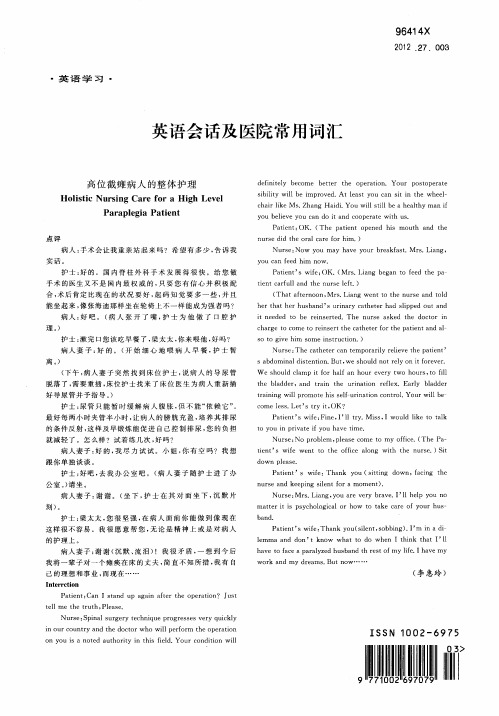
护 士 : 完 口您 该 吃早 餐 了 , 太 太 , 漱 梁 你来 喂 他 , 吗 ? 好 病 人 妻 子 : 的 。 ( 始 细 心 地 喂 病 人 早 餐 , 士 暂 好 开 护
离 。 )
S a d mi a it n in Bu , h u d n tr l n i f r v r b o n 1 s e to . t wes o l o e yo o e e . d t
de i t l be om e b te t e o r ton Yo po t e a e fnie y e e t r h pe a i . ur s op r t s b l y wilbe i pr e i ii l t m ov d.At la t y a sti he w h e — e s ou c n i n t e l c i i e M s Zha adiY o ils ilbea h a t a f har lk . ng H i . u w l tl e lhy m n i yo e iv u c n o i nd c pe a e w ih US u b le e yo a d ta oo r t t .
te tc r u la h r e 1f.) i n a f l nd t e nu s e t ( h fe no T ata t r on, r .Li g we O t r e a o d M s an ntt he nu s nd t l
合 , 后 肯 定 比 现 在 的 状 况 要 好 , 码 知 觉 要 多 一 些 , 且 术 起 并 能 坐起 来 , 张 海 迪 那 样 坐 在轮 椅 上 不 一 样 能 成 为 强 者 吗 ? 像 病 人 : 吧 。 ( 人 张 开 了 嘴 , 士 为 他 做 了 口 腔 护 好 病 护
英语治愈文案带翻译

英语治愈文案带翻译Healing Words: The Power of English in Emotional Recovery。
治愈之言,英语在情感恢复中的力量。
Words have the power to heal. This is especially true for those who have experienced emotional trauma or are struggling with mental health issues. The use of English in therapy and self-care can be a powerful tool in the journey towards healing and recovery.言语有治愈的力量。
对于那些经历过情感创伤或正在努力应对心理健康问题的人来说,英语在治疗和自我护理中可以成为一个强大的工具,帮助他们走向愈合和恢复之路。
English is a global language, spoken by millions of people around the world. Its widespread use means that there are countless resources available in English for those seeking help and support. From online forums to self-help books, English-language materials can provide a wealth of information and guidance for those struggling with emotional issues.英语是一种全球性语言,被数百万人在世界各地使用。
其广泛使用意味着有无数的英语资源可供那些寻求帮助和支持的人使用。
护理常用英语对话

护理常用英语对话1. Taking TemperatureNurse: I am going to take your temperature. Please open your mouth.Patient: Okay.2. Taking Blood PressureNurse: I need to check your blood pressure. Can you roll up your sleeve?Patient: Yes, sure.3. Changing BandagesNurse: I am going to change your bandage. Please take off your shirt.Patient: Okay.4. Assisting With WalkingNurse: I need to help you walk to the bathroom. Can you put your arm around my shoulder?Patient: Yes, of course.5. Giving MedicationNurse: I need you to take your medication now. Can you take this pill with some water?Patient: Yes, I can.6. Giving a BathNurse: I am going to give you a bath now. Can you get on the bed so I can help you?Patient: Sure, I can do that.7. Setting Up an IVNurse: I need to set up an IV. Can you tell me where your veins are so I can put it in?Patient: My veins are usually in my left arm.8. Measurement of Fluid IntakeNurse: I am going to measure your fluid intake. Can you drink this glass of water for me?Patient: Okay.9. Taking PulseNurse: I need to take your pulse. Can you put your finger on this device?Patient: Yes, I can do that.10. Changing PositionNurse: I need to help you change positions in bed. Can you scoot over a bit so I can help you?Patient: Yes, of course.。
护理专业英语重点
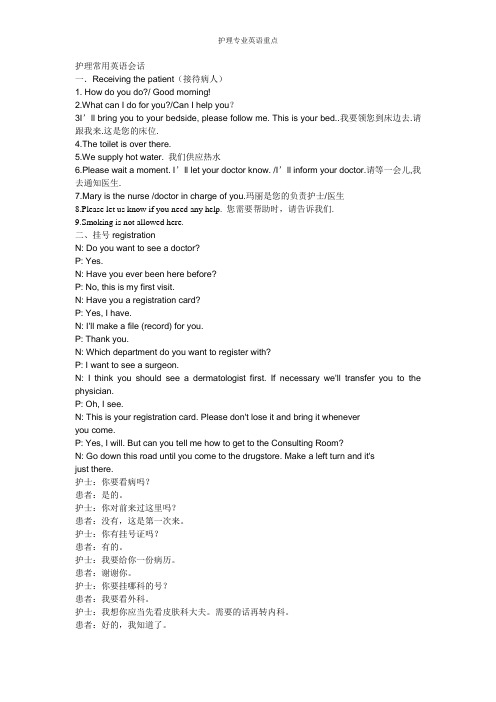
护理常用英语会话一.Receiving the patient(接待病人)1. How do you do?/ Good morning!2.What can I do for you?/Can I help you?3I’ll bring you to your bedside, please follow me. This is your bed..我要领您到床边去.请跟我来.这是您的床位.4.The toilet is over there.5.We supply hot water. 我们供应热水6.Please wait a moment. I’ll let your doctor know. /I’ll inform your doctor.请等一会儿,我去通知医生.7.Mary is the nurse /doctor in charge of you.玛丽是您的负责护士/医生8.Please let us know if you need any help. 您需要帮助时,请告诉我们.9.Smoking is not allowed here.二、挂号registrationN: Do you want to see a doctor?P: Yes.N: Have you ever been here before?P: No, this is my first visit.N: Have you a registration card?P: Yes, I have.N: I'll make a file (record) for you.P: Thank you.N: Which department do you want to register with?P: I want to see a surgeon.N: I think you should see a dermatologist first. If necessary we'll transfer you to the physician.P: Oh, I see.N: This is your registration card. Please don't lose it and bring it wheneveryou come.P: Yes, I will. But can you tell me how to get to the Consulting Room?N: Go down this road until you come to the drugstore. Make a left turn and it'sjust there.护士:你要看病吗?患者:是的。
实用医学英语会话:护士篇
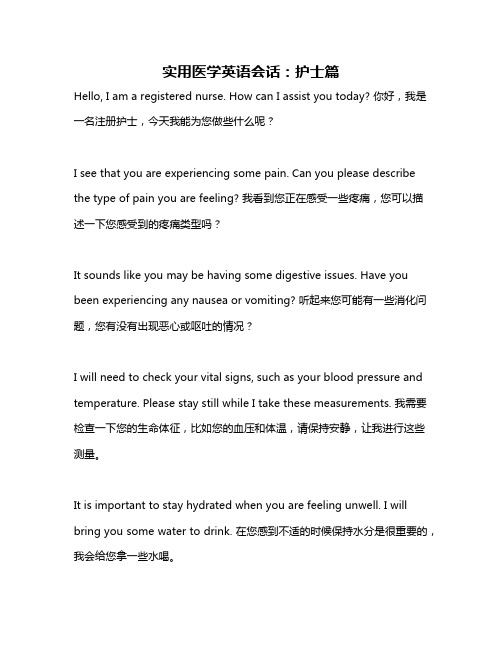
实用医学英语会话:护士篇Hello, I am a registered nurse. How can I assist you today? 你好,我是一名注册护士,今天我能为您做些什么呢?I see that you are experiencing some pain. Can you please describe the type of pain you are feeling? 我看到您正在感受一些疼痛,您可以描述一下您感受到的疼痛类型吗?It sounds like you may be having some digestive issues. Have you been experiencing any nausea or vomiting? 听起来您可能有一些消化问题,您有没有出现恶心或呕吐的情况?I will need to check your vital signs, such as your blood pressure and temperature. Please stay still while I take these measurements. 我需要检查一下您的生命体征,比如您的血压和体温,请保持安静,让我进行这些测量。
It is important to stay hydrated when you are feeling unwell. I will bring you some water to drink. 在您感到不适的时候保持水分是很重要的,我会给您拿一些水喝。
I have administered the medication as prescribed by the doctor. Please let me know if you experience any side effects. 我已按医生的处方给您服用了药物,请告诉我您是否有任何副作用。
护理英语对话完整版
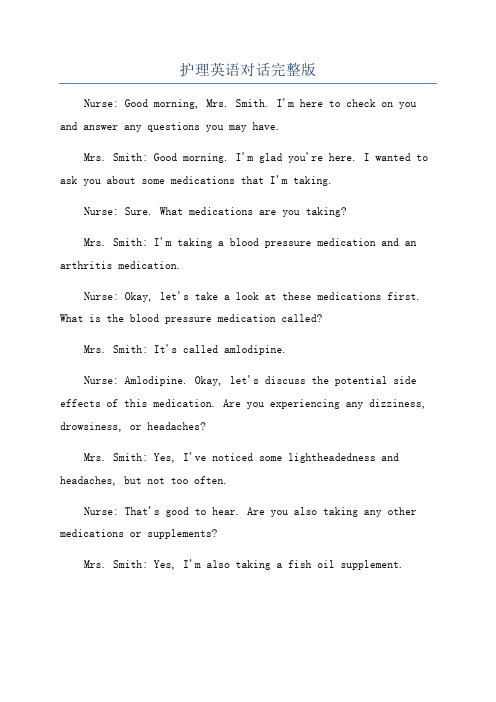
护理英语对话完整版Nurse: Good morning, Mrs. Smith. I'm here to check on you and answer any questions you may have.Mrs. Smith: Good morning. I'm glad you're here. I wanted to ask you about some medications that I'm taking.Nurse: Sure. What medications are you taking?Mrs. Smith: I'm taking a blood pressure medication and an arthritis medication.Nurse: Okay, let's take a look at these medications first. What is the blood pressure medication called?Mrs. Smith: It's called amlodipine.Nurse: Amlodipine. Okay, let's discuss the potential side effects of this medication. Are you experiencing any dizziness, drowsiness, or headaches?Mrs. Smith: Yes, I've noticed some lightheadedness and headaches, but not too often.Nurse: That's good to hear. Are you also taking any other medications or supplements?Mrs. Smith: Yes, I'm also taking a fish oil supplement.Nurse: Great. Fish oil is a great supplement to take. Are you experiencing any other side effects from this medication or supplement?Mrs. Smith: Not really. I haven't noticed anything else.Nurse: That's good news. Are you taking any other medications?Mrs. Smith: Yes, I'm taking an arthritis medication called naproxen.Nurse: Okay, great. Let's discuss the potential side effects of this medication. Are you experiencing any stomach pain, nausea, or vomiting?Nurse: Okay, that's important to note. We will monitor these side effects closely. Are you experiencing any other sideeffects from this medication?Mrs. Smith: No, not that I can think of.Nurse: Alright, that's good to hear. Are you taking any other medications or supplements?Mrs. Smith: No, that's it.Mrs. Smith: No, that's all I had. Thank you so much.。
英语会话及医院常用词汇

a dIm u p s dt a e cr fy u t Si myjb t o n ’ s p o e O tk a eo o .I ’ s o O d
e e y hig f r y v r t n o ou, ic u ng h p n y u O l a up fe n l di eli g o t ce n a t r d f c tng I ou d e t o d i e e a i . fy on t a r rnk, y u o wilno ha e — l t v e
・
英 语 学 习 ・
英语 会话 及医院 常 用词汇
腹 泻 病人 的进 食 指 导
Di t r n t u to s t te t e a y I s r c i n o a Pa i ntwi h
Di r a ar he
Re uh : s U n rt a eofhe r e t a in o k he e l de he c r rnu s , he p te tt o rm a s a d m e cne o c d ul n r d ly r c ve e . n dii n s he e a d g a ual e o r d
( 惠玲 ) 李
护 士 : 少 吃 少 喝 的 原 因 是 这 样 的 。噢 !不 必 担 心 这 你
些 , 是 不 需 要 的 。我 是 您 的 责 任 护 士 , 您 做 一 切 护 理 包 那 为 括 帮 助 你 清 洁 排 便 都 是 我 的 工 作 。您 若 不 按 时 吃 喝 , 有 没 足 够 的 营 养 , 就 不 会 很 快好 起 来 , 就 没 有 力 气 自理 大 小 病 也 便 。 样 不 仅 给 自己 , 给 家 人 带来 很 多不 便 。您 还 记 得 刚 那 也
医院英语对话

《医院英语对话》- 挂号及办公室工作(2008-06-16 01:26:15)转载标签:医学英语分类:医学临床英语护理临床杂谈摘自陈淑坚主编《医院会话》Registration and Work in the Office挂号及办公室工作Nurse:Do you want to see a doctor 你要看病吗?Patent:Yes,where shall I register 是的,在哪儿挂号?N:Here, have you been here before 这儿,你从前来过吗?P:Yes,a year age./NO,this is my first visit.是的,一年前来过./没有,这是第一次来.N:Have you a registration card 你有挂号证吗?P:Yes here it is./NO,I forgot to bring it.有,在这儿呢./ 没有,我忘记带了.N:Do you remember your card number 你记得你的挂号证号码吗?P:Yes,it is C dash one,five,zero, eight,four, three./No.I can’t remember it.记得,是C-150843./不记得了.N:When did you come last 上次你什么时侯来的?P:About a week age. 大约在一周以前.N:Then I’11find out for you.那么,我给你查查.Are you working in the Embassy 你在大使馆工作吗?P: Yes I’ll be here for three to five years. 是的,我要在这儿呆三至五年.I’m a teacher at…我是…的教师.N:Pleas show me your identity card (diplomati certificat e,experts certificate,passport).请出示你的身份证(外交官证、专家证、护照)。
护理情景对话英语作文
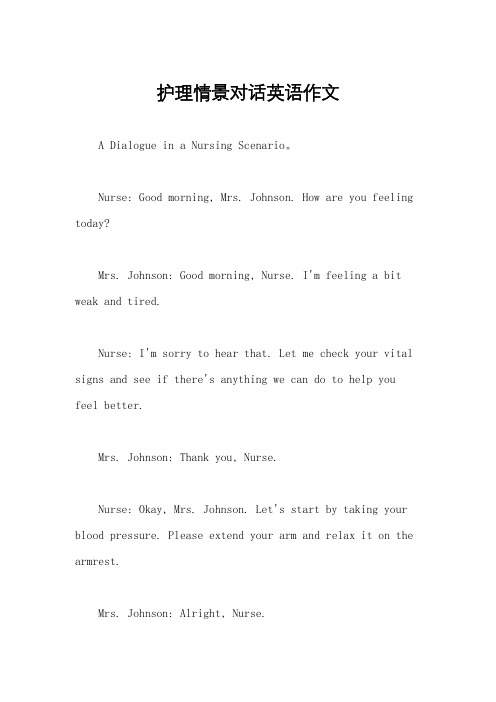
护理情景对话英语作文A Dialogue in a Nursing Scenario。
Nurse: Good morning, Mrs. Johnson. How are you feeling today?Mrs. Johnson: Good morning, Nurse. I'm feeling a bit weak and tired.Nurse: I'm sorry to hear that. Let me check your vital signs and see if there's anything we can do to help you feel better.Mrs. Johnson: Thank you, Nurse.Nurse: Okay, Mrs. Johnson. Let's start by taking your blood pressure. Please extend your arm and relax it on the armrest.Mrs. Johnson: Alright, Nurse.Nurse: (wrapping the blood pressure cuff around Mrs. Johnson's arm) Just breathe normally while I inflate the cuff. (waits for a few seconds) Okay, I'm releasing the air now. Let's see the reading. Your blood pressure is slightly elevated. I will inform the doctor about it.Mrs. Johnson: Thank you, Nurse. I've been feeling a bit stressed lately. Maybe that's why.Nurse: Stress can indeed affect blood pressure. I'll make sure to inform the doctor, and we can discuss some stress management techniques that might help you.Nurse: Now, let's check your temperature. I'll use an oral thermometer for this. Please open your mouth and place the thermometer under your tongue.Mrs. Johnson: Alright, Nurse.Nurse: (placing the thermometer under Mrs. Johnson's tongue) Keep it there for a minute. (after a minute) Okay,let's see the reading. Your temperature is slightly elevated as well. I'll note it down and inform the doctor.Mrs. Johnson: Thank you, Nurse. I've been feeling a bit feverish since yesterday.Nurse: I'll make sure the doctor knows about it. In the meantime, try to rest and drink plenty of fluids to stay hydrated.Nurse: Lastly, I'll check your pulse and oxygen saturation level. I'll use a pulse oximeter for this. I'll attach it to your finger.Mrs. Johnson: Alright, Nurse.Nurse: (attaching the pulse oximeter to Mrs. Johnson's finger) Just stay still for a moment while it takes the readings. (after a few seconds) Your pulse is within the normal range, but your oxygen saturation level is slightly low. I'll inform the doctor about it.Mrs. Johnson: Thank you, Nurse. I've been having some difficulty breathing lately.Nurse: I'll make sure the doctor is aware of your breathing difficulties. In the meantime, try to take slow, deep breaths and avoid any strenuous activities.Nurse: Mrs. Johnson, based on the readings, it seemslike your health is a bit compromised. I will inform the doctor about your elevated blood pressure, temperature, and low oxygen saturation level. The doctor will determine the best course of action to help you feel better.Mrs. Johnson: Thank you, Nurse. I appreciate your help and care.Nurse: You're welcome, Mrs. Johnson. It's my duty to ensure your well-being. Please don't hesitate to let me know if there's anything else I can do for you.In this dialogue, a nurse interacts with a patient, Mrs. Johnson, and performs various assessments to determine herhealth status. The nurse checks Mrs. Johnson's blood pressure, temperature, pulse, and oxygen saturation level. Based on the readings, the nurse informs the doctor about the patient's elevated blood pressure, temperature, and low oxygen saturation level. The nurse also provides support and offers advice on stress management, rest, hydration, and breathing techniques. The dialogue highlights the importance of regular health assessments and the role of nurses in providing holistic care to patients.。
医疗英语对话
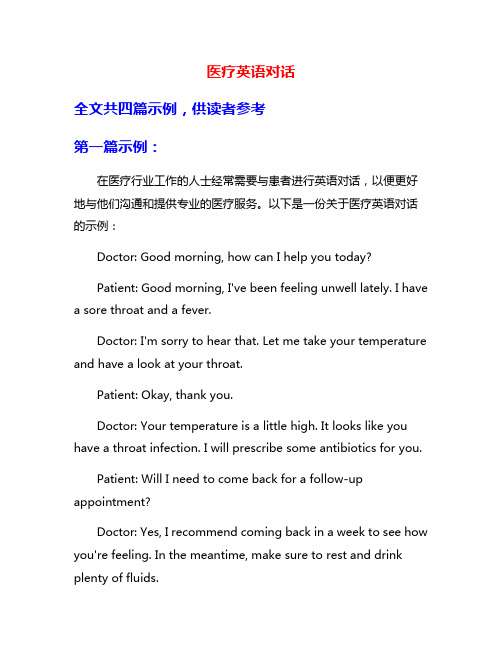
医疗英语对话全文共四篇示例,供读者参考第一篇示例:在医疗行业工作的人士经常需要与患者进行英语对话,以便更好地与他们沟通和提供专业的医疗服务。
以下是一份关于医疗英语对话的示例:Doctor: Good morning, how can I help you today?Patient: Good morning, I've been feeling unwell lately. I have a sore throat and a fever.Doctor: I'm sorry to hear that. Let me take your temperature and have a look at your throat.Patient: Okay, thank you.Doctor: Your temperature is a little high. It looks like you have a throat infection. I will prescribe some antibiotics for you.Patient: Will I need to come back for a follow-up appointment?Doctor: Yes, I recommend coming back in a week to see how you're feeling. In the meantime, make sure to rest and drink plenty of fluids.Patient: Thank you, doctor. I will follow your advice.Doctor: You're welcome. If you have any other concerns, feel free to call the clinic.第二篇示例:医疗英语对话在医疗场所,医生和患者之间的对话至关重要。
护理英语情景对话

护理英语情景对话摘要:I.引言A.介绍护理英语的重要性B.对话在护理实践中的常见场景II.护理英语情景对话实例A.病人主诉1.病人描述症状2.护士询问详细信息B.护士评估1.护士进行身体检查2.护士询问病史和用药情况C.护理计划1.护士解释护理计划2.病人同意并配合护理计划D.健康教育1.护士提供健康知识2.病人询问问题并表达理解III.护理英语情景对话的关键技巧A.有效沟通技巧1.清晰发音2.语速适中3.保持眼神交流B.倾听技巧1.病人说话时保持安静2.确认理解正确C.礼貌和尊重1.使用敬语2.尊重病人隐私IV.结论A.总结护理英语情景对话的重要性B.强调提高护理英语沟通能力对护理工作的重要性正文:护理英语是护理实践中不可或缺的一部分,能够帮助护士和病人之间进行有效的沟通。
在护理实践中,有很多场景需要用到英语,例如病人主诉、护士评估、护理计划和健康教育等。
通过一个典型的护理英语情景对话,我们可以看到护理英语的重要性和关键技巧。
在一个护理英语情景对话中,病人首先向护士描述自己的症状,例如:“我最近感觉肚子不舒服,可能是昨晚吃得太多了。
”护士需要询问详细的症状和病史,例如:“您的不适感持续了多久?是否有其他症状?”在这个过程中,护士需要使用清晰的语言和适中的语速,保持与病人的眼神交流,以表示关注和理解。
同时,病人也需要认真倾听护士的问题,并确认自己的理解正确。
在病人主诉之后,护士需要进行身体检查和病史询问,以评估病人的状况。
在这个过程中,护士需要使用专业术语,例如:“我需要检查您的血压和体温。
”病人需要配合护士的检查,并回答相关问题。
此外,护士还需要向病人解释护理计划,例如:“我建议您增加水分摄入,并注意休息。
”病人需要同意并配合护理计划,以促进康复。
在健康教育环节,护士需要向病人提供健康知识,例如:“您需要注意饮食卫生,以预防腹泻。
”病人可以在此环节向护士询问问题,并表达自己的理解。
通过健康教育,病人可以更好地了解自己的健康状况,并采取预防措施。
- 1、下载文档前请自行甄别文档内容的完整性,平台不提供额外的编辑、内容补充、找答案等附加服务。
- 2、"仅部分预览"的文档,不可在线预览部分如存在完整性等问题,可反馈申请退款(可完整预览的文档不适用该条件!)。
- 3、如文档侵犯您的权益,请联系客服反馈,我们会尽快为您处理(人工客服工作时间:9:00-18:30)。
Receiving the patient (接待病人)二. 1.How do you do?/ Good morning!三. 您好!(初次见面时使用)/ 早上好!四. 2.What can I do for you?/Can I help you?五. 您需要我帮助吗?六. 3.I'll bring you to your bedside, please follow me. This is your bed..七. 我要领您到床边去.请跟我来.这是您的床位.八. 4.The toilet is over there. 卫生间在那边九. 5.We supply hot water. 我们供应热水十. 6.Please wait a moment. I'll let your doctor know. /I 'll inform your doctor. 十一. 请等一会儿,我去通知医生.十二. 7.Mary is the nurse /doctor in charge of you. 玛丽是您的负责护士/ 医生十三. 8.Please let us know if you need any help. 您需要帮助时,请告诉我们. 十四.9.Smoking is not allowed here. 这里不允许吸烟十五. 二.in formati on collect ion(收集信息)十六. 10.Do you mind if I ask you a few questions? 您介意我问您几个问题吗? 十七. 11.We need some information from you. 我们需要从您这儿收集一些信息十九. 13.Does your pain come on after or before meals? 您的疼痛是在饭前还是饭后发作?十八. 12.Is your tummy still sore? 您的肚子还疼吗?二十. 14.Does it hurt to pass urine?/when I press here? 排尿时痛吗?/ 当我按压这儿时痛吗?二十一. 15.Does your back ache? 您的后背痛吗?二十二. 16.Do your feet swell? 您的脚肿了吗?二十三. 17.Do you have a cough/fever? 您咳嗽吗?/ 您有发热吗?二十四. 18.Do you bring up any sputum? 您咳痰吗?二十五. 19.Is there any radiation of the pain ? (to the shoulder)有放射(到肩部的)痛吗?二十六. 20.How long have you had the pain? 您的痛有多长时间了?二十七. 21.When did the pain start?/where is your pain? 疼痛从什么时候开始的/ 什么地方疼痛?二十八. 22.Are your periods regular? 您的月经规则吗?二十九. 三.Physical examination (查体)三十. 23.Will you please undress for medical examination? 请您脱下衣服做体检好吗?三十一. 24.Take off your clothes, please. 请把衣服脱下来三十二. 25.Lie downon the couch, please./Just lie still on the couch and relax.三十三. 请躺在治疗床上./ 请安静地躺在治疗床上, 放松.三十四. 26.Bend your knees, please. 请屈膝.三十五. 27.Open your mouth and say ‘ah” 张开口, 说: 啊三十六. 28.Beathe deeply, please./take a deep breath, please. 请深呼吸三十七. 29.May I examine your tummy, please? 我要检查下您的肚子, 好吗?三十八. 30.Roll up your sleeves, please. 请卷起袖子.三十九. 四.communication.(交流)四十. 31.I am going to take your temperature./Please put the thermometer under your armpit. 四十一. 我要测一下您的体温/ 请把体温计放在您的腋下.四十二. 32.Let me feel your pulse. 让我测一下您的脉搏.四十三. 33.I 'll test/take your blood pressure. 我要测量您的血压.四十四. 34. I 'm afraid I have to prick your finger and take a drop of blood for blood sugar level.四十五. 我要取一滴指血做血糖测定, 需要刺一下手指.四十六 . 35.I 'll take some blood from your arm now.四十七 . 36.Don 't take any thing by mouth after midnight until the blood isdrawn tomorrow morning .四十八 . 半夜之后不要吃喝任何东西,明天早上抽血 .四十九 . 37.Please bring a specimen of your urine/stool/sputum./ please collect your mid-stream specimen of urine.五十. 请留一份尿 / 便/痰的标本 / 请收集您的中段尿 .五十一 . 38.Please have your blood and urine tests done. 请做一下您的血和尿 试验.五十二 . 39.You are going to have a CT-scan of your chest/head today. 今天您 要做一个胸部/ 头部 CT.五十三 . 40.You are going to have a chest X-ray this morning. 今天早上您要拍 一个胸片 . 五十四 . 41.You are going to have a B-mode ultrasonic exam. Please keep yourbladder full. 您要做B 超检查,请留尿,使膀胱充盈.五十五. 42.You are going to have an gastric endoscopy tomorrow morning. please don 't eator drink anything after 12 o 'clock tonight. 明天上午您要做胃镜 检查,今晚 12 点之后,请不要吃喝任何东西。
五十六. 43.You are going to have urine catheterization now. 现在我要从您的胳膊抽血 . 现在您需要导尿 .五十七. 44.I 'm going to do an ECG for you. 我要给您做心电图五十八. 45.I 'm going to put a gastric tube into your stomach, this is for gastrointestinal decompression.五十九. 我要放胃管到您的胃内,这是胃肠减压.六十. We can feed you the necessary nutrients through the tube. Please swallow the tube as I put it down.六十一. 我们通过胃管给您必要的营养.当我放管时,请做吞咽动作.六十二. 46.I 'm going to make your bed./ we' ll change the bed linen at once.六十三. 我要给您整理床铺/ 我们马上给您换床单.六十四. 47.I 'll apply a cold(hot) compress to your ankle. 我要给您的踝部冷/ 热敷六十五. 48.An operation will be done tomorrow/ an emergency operation must be done now.六十六. Will you please sign to give your permission for your operation?六十七. 明天将做手术/ 现在马上做急诊手术. 同意手术请您签字好吗?六十八. 49.I 'm going to shave your skin. / I 'm going to do skin preparation for you.六十九. 我要给您做备皮/ 我要给您做皮肤准备a.七十. 50.You're going to have a local/general/epidural anaesthesi七十一. 要给您做局麻/全身麻醉/硬膜外麻醉.七十二. 51.Are you allergic to any medication?/ penicillin? 您对什么药物/ 青霉素过敏吗?七十三. 52. I 'm going to do a skin test of pennicillin for you./ If you feelitchy or short of breath, please let me know at once. I 'll see the resultin fifteen minutes. /I 'm going to do a tetanus hypersensitive test for you. 我要给您做青霉素皮试. 如果您感到痒或气短, 请立刻告诉我./ 我十五分钟后看结果./ 我要给您做破伤风皮试.七十四. 53.I 'm going to give you an intramuscular injection./intravenousinfusion/hypodermic injection. 我要给您做肌肉/ 静脉/ 皮内注射七十五. 54.I 'm going to give you an enema to hel p you pass motion. 我要给您灌肠, 帮助您排便七十六. 55.The doctor will change your dressing. /The doctor will remove your stitches.七十七. 医生要给您换药/ 医生要给您拆线.七十八. 56.I 'm going to give you oxygen now. 我要给您吸氧七十九. 57.I 'm going to give you nebulization. 我要给您(雾化)吸入.八十. 58. I 'm going to do bladder irrig ation for you. 我要给您做膀胱冲洗八十一. 59.You have to rest in bed for at least one week 您至少要卧床休息一周.八十二. 60.How are you today? How was your sleep last night? How is your appetite?八十三. 您今天怎么样?您昨晚睡得怎么样?您的食欲怎么样?八十四. 61.Did you pass motion yesterday?/Are your bowel movements normal?八十五. 昨天您排便了吗?/ 您的大便正常吗?八十六. 62.What color of your urine? 您的尿液什么颜色?八十七. 63.How much urine do you pass each time? 您每次排尿多少?八十八. 64.You will have skin/cervical traction. 要给您做皮肤/ 颈部牵引八十九. 65. Take more exercises./Do some light work, have a happy outlook, avoid excitement and too much worry. Be careful not to stumble.九十. 多做锻炼/做一些轻体力活动,保持良好的心态,避免兴奋和过度忧虑,小心不要摔倒九十一. 66.You are going to have a blood transfusion. 要给您输血九十二. 67.The results are normal. 结果正常九十三. 68.You are suffering from ~/Your disease was diagnosed as ~ 您的病诊断为~九十四. 69.You have to stop smoking and alcohol.您必须戒烟、戒酒九十五. 五.about medication and nutrition (关于药物和营养)九十六. 70.Take two tablets three times a day after/before food. 饭前/ 饭后服,每日三次,每次两粒.九十七. 71.Take the medicine with a lot of water. 服用此药,要多饮水.九十八. 72.I 'll give you an injection twice a day. 我要给您注射, 每日两次. 九十九. 73.This medicine is used for preventing infection/treatinginfection/relieving your pain/protecting your stomach/supplying nutrients/ bringing down your temperature/ intracranial pressure/stopping bleeding/百. 这种药是为了预防感染/治疗感染/减轻疼痛/保护您的胃/提供营养/降低体温/降低颅内压/停止出血百一. 74.You should have a low fat/ low salt/ light diet/high caloric diet/high protein/soft diet/liquid food.百二. 您的进食应该是低脂/低盐/ 轻淡/ 高热量/高蛋白/ 软食/流食的食物百三. 75.Please take some more nourishing food. 请食营养多的食物.百四. 六.comforting (安慰)百五. 76.Never mind/It doesn 't matter 没关系百六. 77.Don't worry 不要担心百七. 78.Don' t be nervous. You are in good hands. 不要紧张, 操作者是高手百八. 79.You will recover soon. 您很快就会康复的百九.80.Please come back to see the doctor for check-up in twoweeks. 请两周后来看医生复Intravenous Infusion 静脉输液Nurse :Good morning , Mr. Zhang. It 's time for me to give you intravenousinfusion.护士: 张先生, 上午好! 该给您输液了。
